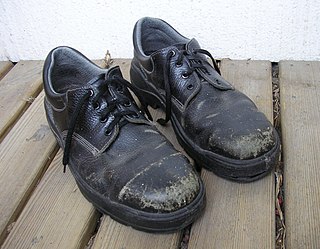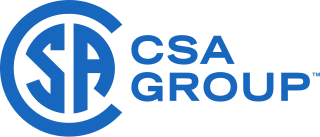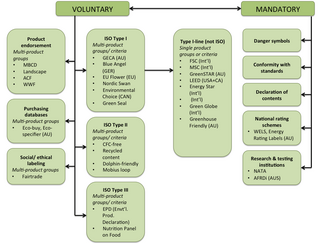
The American National Standards Institute is a private nonprofit organization that oversees the development of voluntary consensus standards for products, services, processes, systems, and personnel in the United States. The organization also coordinates U.S. standards with international standards so that American products can be used worldwide.
Conformance testing — an element of conformity assessment, and also known as compliance testing, or type testing — is testing or other activities that determine whether a process, product, or service complies with the requirements of a specification, technical standard, contract, or regulation. Testing is often either logical testing or physical testing. The test procedures may involve other criteria from mathematical testing or chemical testing. Beyond simple conformance, other requirements for efficiency, interoperability, or compliance may apply. Conformance testing may be undertaken by the producer of the product or service being assessed, by a user, or by an accredited independent organization, which can sometimes be the author of the standard being used. When testing is accompanied by certification, the products or services may then be advertised as being certified in compliance with the referred technical standard. Manufacturers and suppliers of products and services rely on such certification including listing on the certification body's website, to assure quality to the end user and that competing suppliers are on the same level.

A steel-toe boot is a durable boot or shoe that has a protective reinforcement in the toe which protects the foot from falling objects or compression. Safety shoes are effective in keeping the feet of industrial workers safe from sharp and heavy objects while working in factories.

In forensic science, questioned document examination (QDE) is the examination of documents potentially disputed in a court of law. Its primary purpose is to provide evidence about a suspicious or questionable document using scientific processes and methods. Evidence might include alterations, the chain of possession, damage to the document, forgery, origin, authenticity, or other questions that come up when a document is challenged in court.

ASTM International, formerly known as American Society for Testing and Materials, is an international standards organization that develops and publishes voluntary consensus technical standards for a wide range of materials, products, systems, and services. Some 12,575 ASTM voluntary consensus standards operate globally. The organization's headquarters is in West Conshohocken, Pennsylvania, about 5 mi (8.0 km) northwest of Philadelphia.

The CSA Group is a standards organization which develops standards in 57 areas. CSA publishes standards in print and electronic form, and provides training and advisory services. CSA is composed of representatives from industry, government, and consumer groups.
Quality Assurance International (QAI) is a U.S.-based international organic certification company that is authorized by the United States Department of Agriculture (USDA) as "a USDA-accredited certifying agent that operates globally to certify organic operations to National Organic Program standards." It is a for-profit corporation, established in 1989, and headquartered in San Diego, California. It is one of the world's largest certifiers, operating in the United States, Canada, Latin America, European Union, and Japan.

Ecolabels and Green Stickers are labeling systems for food and consumer products. The use of ecolabels is voluntary, whereas green stickers are mandated by law; for example, in North America major appliances and automobiles use Energy Star. They are a form of sustainability measurement directed at consumers, intended to make it easy to take environmental concerns into account when shopping. Some labels quantify pollution or energy consumption by way of index scores or units of measurement, while others assert compliance with a set of practices or minimum requirements for sustainability or reduction of harm to the environment. Many ecolabels are focused on minimising the negative ecological impacts of primary production or resource extraction in a given sector or commodity through a set of good practices that are captured in a sustainability standard. Through a verification process, usually referred to as "certification", a farm, forest, fishery, or mine can show that it complies with a standard and earn the right to sell its products as certified through the supply chain, often resulting in a consumer-facing ecolabel.

Certification is part of testing, inspection and certification and the provision by an independent body of written assurance that the product, service or system in question meets specific requirements. It is the formal attestation or confirmation of certain characteristics of an object, person, or organization. This confirmation is often, but not always, provided by some form of external review, education, assessment, or audit. Accreditation is a specific organization's process of certification. According to the U.S. National Council on Measurement in Education, a certification test is a credentialing test used to determine whether individuals are knowledgeable enough in a given occupational area to be labeled "competent to practice" in that area.

Product certification or product qualification is the process of certifying that a certain product has passed performance tests and quality assurance tests, and meets qualification criteria stipulated in contracts, regulations, or specifications.
ISO/IEC 17025General requirements for the competence of testing and calibration laboratories is the main standard used by testing and calibration laboratories. In most countries, ISO/IEC 17025 is the standard for which most labs must hold accreditation in order to be deemed technically competent. In many cases, suppliers and regulatory authorities will not accept test or calibration results from a lab that is not accredited. Originally known as ISO/IEC Guide 25, ISO/IEC 17025 was initially issued by ISO/IEC in 1999. There are many commonalities with the ISO 9000 standard, but ISO/IEC 17025 is more specific in requirements for competence and applies directly to those organizations that produce testing and calibration results and is based on more technical principles. Laboratories use ISO/IEC 17025 to implement a quality system aimed at improving their ability to consistently produce valid results. Material in the standard also forms the basis for accreditation from an accreditation body.

An equestrian helmet is a form of protective headgear worn when riding horses. This type of helmet is specially designed to protect the rider's head in the event of falls from a horse, especially from striking a hard object while falling or being accidentally struck in the head by a horse's hoof.
The Air Movement and Control Association International, Inc. (AMCA) is an American trade body that sets standards for Heating, Ventilation and Air Conditioning (HVAC) equipment. It rates fan balance and vibration, aerodynamic performance, air density, speed and efficiency.
The American Society of Safety Professionals (ASSP), formerly known as American Society of Safety Engineers (ASSE), is a global organization of occupational safety and health (OSH) professional members who manage, supervise, research and consult on work-related OSH concerns across all industries. Society members use risk-based approaches to prevent workplace fatalities, injuries and illnesses.
A certification listing is a document used to guide installations of certified products, against which a field installation is compared to make sure that it complies with a regulation. Typically, products or items are required to be installed or used in accordance with a subject-related certification listing if those products or items are subject to product certification and must be used in a specific manner in order to be safe for use. Certification listings are issued by organisations that are usually nationally accredited for doing both testing and product certification work, in accordance with nationally accredited standards.

The Bureau of Indian Standards (BIS) is the National Standards Body of India under Department of Consumer affairs, Ministry of Consumer Affairs, Food & Public Distribution, Government of India. It is established by the Bureau of Indian Standards Act, 2016 which came into effect on 12 October 2017. The Minister in charge of the Ministry or Department having administrative control of the BIS is the ex-officio President of the BIS. BIS has 500 plus scientific officers working as Certification Officers, Member secretaries of technical committees and lab OIC's.
Accredited Crane Operator Certification OSHA regulation 29 CFR 1926 Subpart CC, released August 9, 2010, requires crane operators involved in construction to be certified by an accredited certification provider by November 10, 2014. An operator is defined as any person operating the equipment. To be accredited, certification providers must be accredited by a nationally recognized accrediting agency, defined as "an organization that, due to its independence and expertise, is widely recognized as competent to accredit testing organizations. Examples of such accrediting agencies include, but are not limited to, the National Commission for Certifying Agencies and the American National Standards Institute." This is the first time certification by an accredited certification provider has been required on a national level, although individual states and cities have required crane operator certification as far back as 2000. The new OSHA standards make the completion of this requirement an important topic of knowledge for the crane and lifting industry.

NSF is a product testing, inspection, certification organization with headquarters in Ann Arbor, Michigan. NSF also offers consulting and training services worldwide.
The National Operating Committee on Standards for Athletic Equipment is a nonprofit standards organization which develops standards for the manufacture of certain protective athletic equipment in the sports of baseball, football, hockey, lacrosse, and polo. NOCSAE conducts and funds scientific research and collects and analyzes data relating to standards development.
Audio visual and Integrated Experience Association (AVIXA) is a non-profit organization for audiovisual companies and related professionals headquartered in Fairfax, Virginia. AVIXA was formed originally as the National Association of Visual Education Dealers in 1939 and has merged with other organizations and changed names several times since then, most recently from InfoComm International to AVIXA in 2017.











